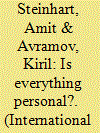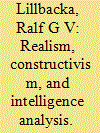| Srl | Item |
| 1 |
ID:
122915


|
|
|
|
|
| Publication |
2013.
|
| Summary/Abstract |
The massive amount of scientific and popular literature in the emerging field of "theory of intelligence" published over the past decades has been dedicated to analyzing the effects of intelligence organizations and their products in the political decisionmaking process. Different facets of the phenomenon are covered by using various analytical vehicles since a thorough analysis of its perplexities requires a multidisciplinary approach that includes expertise not only in political science but in sociology, psychology, history, and organizational and business management studies.
|
|
|
|
|
|
|
|
|
|
|
|
|
|
|
|
| 2 |
ID:
167494


|
|
|
| 3 |
ID:
119431


|
|
|
|
|
| Publication |
2013.
|
| Summary/Abstract |
The current rapid expansion of Intelligence Studies 1 is being driven by an increased need for intelligence in an unpredictable post-post Cold War world 2 that features complex operational contexts requiring special expertise, 3 private contractors increasingly performing core intelligence functions, 4 and intelligence missions expanding into completely new fields such as humanitarian action. 5 These trends, unlikely to be reversed in the immediate future, create a demand for the academic training of personnel in growing and diversifying intelligence communities. This will in turn generate an inherent pressure to further establish Intelligence Studies as a separate academic discipline. Not surprisingly, the hitherto fruitless search for a "theory of intelligence" has been rekindled. 6 Considering developments in adjacent disciplines, epistemological issues will, in all likelihood, increasingly come into focus. 7 Among them: What is "knowledge" in intelligence, and what counts as "true" or "justified" knowledge, if any?
|
|
|
|
|
|
|
|
|
|
|
|
|
|
|
|